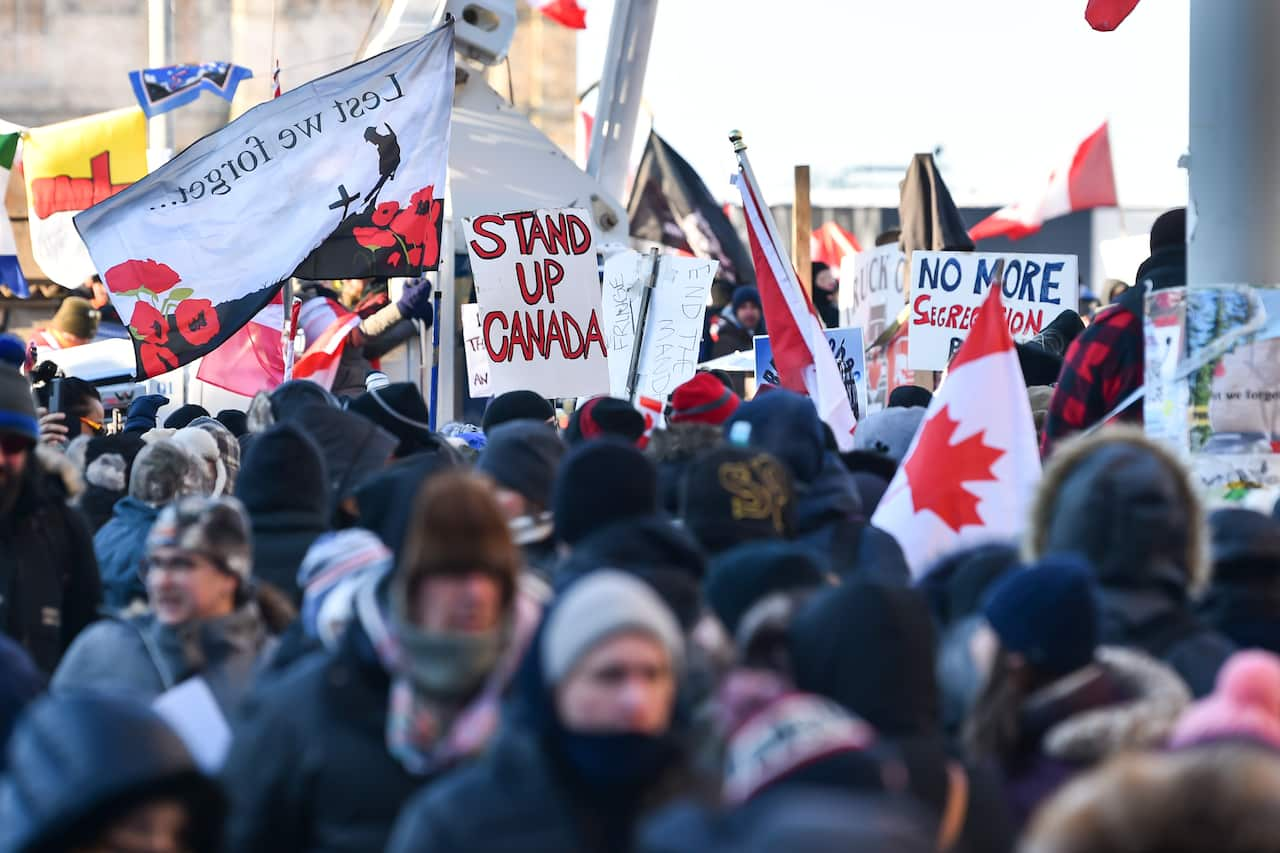Canadian demonstrators led by truckers angry over COVID-19 restrictions defied police and kept occupying a key bridge Saturday, while thousands more rallied in the capital as a two-week-old protest showed no signs of abating.
In Ontario, where authorities have declared a state of emergency, the provincial supreme court had ordered truckers to end their blockade of the strategic Ambassador Bridge, which links the city of Windsor in Canada to Detroit, Michigan in the United States.
It was the fifth straight day demonstrators occupied the key bridge.
The protest has forced major automakers in both countries to halt or scale back production and Washington on Friday urged Ottawa to use its federal powers to end the blockade.
Canada's Prime Minister Justin Trudeau promised "an increasingly robust police intervention," adding that borders cannot remain closed and "this conflict must end."
Canadian police, backed by armored vehicles, began clearing the bridge, taking down tents erected in traffic lanes and persuading some drivers to move their trucks. But by Saturday evening local time, after hours of facing off against the demonstrators, the police had not completely cleared the span. Most of the cars and trucks blocking it were removed but hundreds of people refused to budge.
But by Saturday evening local time, after hours of facing off against the demonstrators, the police had not completely cleared the span. Most of the cars and trucks blocking it were removed but hundreds of people refused to budge.

Protesters hold signs condemning the vaccine mandates imposed by Canadian Prime Minister Justin Trudeau in Ottawa, Canada. Source: Getty
Windsor police spokesman Jason Bellaire said the aim was to clear the bridge peacefully, but he could not say if it would be cleared by the end of the day.
There were no immediate reports of arrests Saturday.
The Ambassador Bridge is vital to the US and Canadian auto industries, carrying more than 25 per cent of merchandise exported by both countries.
Two other US-Canada border crossings, one in Manitoba province and one in Alberta, remained blocked by protests on Saturday evening.
In Ottawa, crowds of thousands packed the streets of the city centre, the epicenter of the movement, blaring horns, playing music, dancing and drinking hot coffee against the bitter cold. Very few police were on hand.
"I've been supporting the cause from the beginning," said 38-year-old Marc-Andre Mallette. "I'm not vaccinated and I'm not dead," added the sewer worker from the town of St-Armand, near the US border.
Truckers originally converged on Ottawa to press their demand for an end to a vaccination requirement affecting truckers crossing the international border.
But the movement has spread, as the protesters - mostly insisting they want to protect their freedoms, but some displaying swastikas or Confederate flags - now seek an end to all vaccine mandates, whether imposed by the federal or provincial governments.
Anti-Trudeau signs and chants have become common along the clogged Ottawa streets.
Political opponents say the prime minister has been far too slow to bring the protests to an end.
Mr Trudeau has repeatedly insisted the protesters represent a small - if noisy - fraction of a population that has largely followed vaccination requirements and guidance.
But anti-COVID measures in some provinces have been more restrictive than in much of the world, and the truckers' message has resonated more widely than authorities expected.
One opinion survey found that a third of Canadians support the protest movement, while 44 per cent say they at least understand the truckers' frustrations.
Since the movement began, some central Canadian provinces have announced plans to end mask and vaccine requirements in coming weeks, with the numbers of COVID-19 cases falling.
But the two most populous provinces - Ontario and Quebec - have yet to follow suit.
The Canadians are not alone in organanising mass protests around COVID-19 rules or vaccines mandates.
In Australia, an estimated 10,000 protesters marched through Canberra to the parliament building to decry vaccine mandates on Saturday.
In Paris on Saturday, police fired tear gas and issued hundreds of fines in an effort to break up convoys of vehicles coming from across France in a protest over COVID-19 restrictions and rising living costs.
While some protesters made it to the glitzy Champs-Elysees, they were unable to block the city's streets.
In the Netherlands, a vehicle convoy brought The Hague's city center to a standstill in another Canada-style protest.
In Switzerland, hundreds of protesters marched in Zurich to protest COVID-19 restrictions, while several thousand others rallied against them, Swiss media reported.
Both rallies were illegal, and police used tear gas, water cannons and rubber bullets to disperse the crowds.
And in New Zealand, anti-mandate activists have been camped on the lawns of parliament in Wellington for days in a protest inspired by the Canadian convoy.


